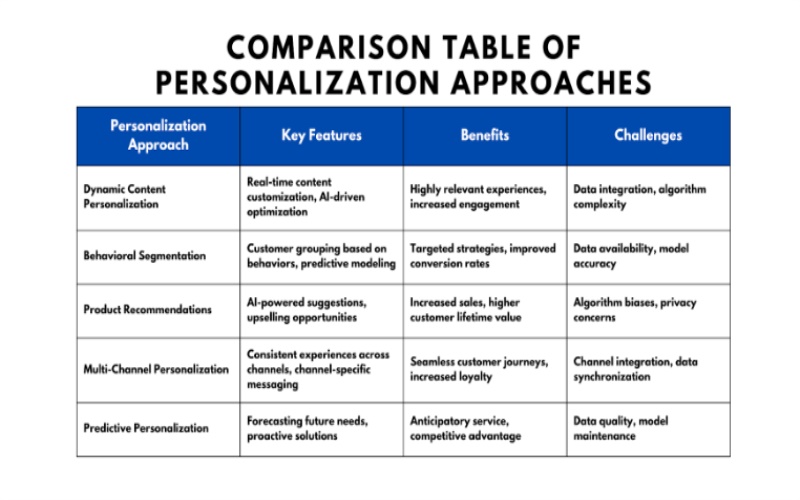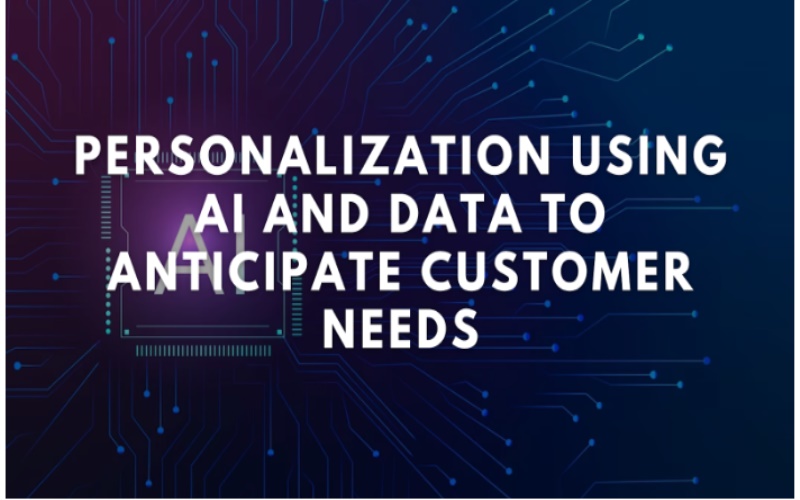In today’s competitive landscape, personalization has become a game-changer for businesses seeking to engage customers and deliver exceptional experiences. As consumer expectations continue to rise, companies are turning to advanced technologies like Artificial Intelligence (AI) and data analytics to anticipate customer needs and preferences proactively.
By harnessing the power of AI and leveraging vast amounts of customer data, businesses can unlock a deeper understanding of their target audience. This, in turn, enables them to create tailored experiences that resonate with individual customers, fostering stronger brand loyalty and driving business growth.
Understanding Customer Behavior Through Data Analysis
To truly understand customer behavior and deliver personalized experiences, businesses need to leverage advanced data analysis techniques. A robust customer experience platform can provide the necessary tools and capabilities to gather, analyze, and extract actionable insights from customer data.
Utilizing AI Algorithms for Data Analysis
AI algorithms are adept at processing and analyzing vast amounts of structured and unstructured data, enabling businesses to uncover valuable insights hidden within their customer data. Advanced data mining techniques, such as clustering, classification, and pattern recognition, play a crucial role in this process.
By leveraging AI algorithms, businesses can extract actionable insights from customer data, revealing patterns, preferences, and behaviors that would be challenging to discern through manual analysis alone. These insights form the foundation for creating personalized experiences that truly resonate with individual customers.
Segmenting Customers Based on Behavior Patterns
Traditional customer segmentation methods often rely on demographic data or purchase histories. However, behavioral segmentation strategies, powered by AI and data analysis, enable businesses to group customers based on their actual behaviors, interests, and interactions with the brand.
AI algorithms can also be used to develop predictive models that forecast future customer behavior. By analyzing historical data and identifying patterns, these models can anticipate customer needs, preferences, and potential actions, allowing businesses to proactively tailor their strategies accordingly.
Implementing Personalized Recommendations

Dynamic Content Personalization
Dynamic content personalization leverages AI and customer data to deliver tailored content in real time. This includes personalized product recommendations, targeted messaging, and customized user experiences based on individual preferences and behaviors.
AI algorithms continuously optimize content delivery, testing different variations and analyzing customer responses to identify the most effective approach for each individual. This iterative process ensures that personalization efforts are consistently refined and improved over time.
Product Recommendations and Upselling Techniques
By analyzing customer data, browsing history, and purchase patterns, AI algorithms can provide highly relevant product recommendations tailored to each individual’s unique preferences and needs.
AI-powered personalization can also be leveraged for upselling techniques, suggesting complementary or higher-tier products to existing customers based on their current preferences and purchase history, ultimately maximizing customer lifetime value.
Enhancing Customer Experience Through Personalization
Customizing Communication Channels
Customers interact with brands through various channels, including websites, mobile apps, social media, and email. Multi-channel personalization approaches ensure a consistent and tailored experience across all touchpoints, leveraging AI and data to adapt content and messaging to each individual’s preferences.
AI algorithms can analyze customer behavior and preferences across different communication channels, enabling businesses to tailor their messaging and content delivery accordingly. For example, personalized push notifications may be more effective for certain customers, while others may prefer personalized email campaigns.
Streamlining Customer Journeys
By leveraging AI and data analysis, businesses can anticipate customer needs along their journey, proactively addressing potential pain points or providing relevant information and support at the right time.
Personalization can also be used to eliminate friction points in the customer journey, such as streamlining checkout processes, simplifying account management, or providing tailored self-service options, creating a seamless and effortless experience for each customer.
Overcoming Challenges and Ensuring Ethical Personalization
Addressing Privacy Concerns
As personalization relies heavily on customer data, it is crucial to address privacy concerns by implementing transparent data handling policies. Businesses should communicate how customer data is collected, used, and protected, empowering customers to make informed decisions.
Robust data security measures, such as encryption and secure storage practices, must be implemented to protect customer data from unauthorized access or misuse. Additionally, businesses should comply with relevant data protection regulations, such as the General Data Protection Regulation (GDPR) and the California Consumer Privacy Act (CCPA).
Mitigating Bias in AI Algorithms
To ensure fair and unbiased personalization, businesses must adopt ethical AI development practices. This includes diversifying training data, implementing bias detection mechanisms, and regularly auditing AI algorithms for potential biases.
Conducting regular algorithm audits is essential to identify and mitigate any biases that may have crept into AI systems over time. This proactive approach helps maintain the fairness and integrity of personalization efforts.
Leveraging AI for Predictive Personalization
Forecasting Future Customer Needs and Preferences
Studies show that over 4 out of 10 business leaders report increased productivity because of AI. This makes it easier to predict future customer needs. Machine learning models, a subset of AI algorithms, can be trained on historical customer data to forecast future needs and preferences with remarkable accuracy.
By leveraging predictive insights, businesses can proactively adapt their personalization strategies, tailoring products, services, and customer experiences to align with anticipated future needs and preferences.
Proactive Customer Service and Support
AI and predictive analytics can be used to anticipate potential customer issues before they arise, enabling businesses to proactively address concerns and provide tailored support.
Using predictive analytics, businesses can offer personalized solutions and recommendations to customers, addressing their unique needs and challenges before they even express them.
Frequently Asked Questions
- How can I ensure that AI-driven personalization maintains customer trust?
Maintaining customer trust is essential for successful personalization efforts. Businesses should prioritize transparency by clearly communicating their data handling policies and practices. Additionally, implementing robust data security measures and respecting customer privacy preferences can help build trust and foster long-term relationships.
- What are the risks associated with over-reliance on AI for customer personalization?
While AI can provide valuable insights and enable personalization, over-reliance on AI algorithms can lead to potential risks, such as perpetuating biases or making decisions based on incomplete or inaccurate data. Businesses should maintain human oversight, regularly audit their AI systems, and continuously refine their approaches to mitigate these risks.
- How can businesses balance personalization with customer data privacy concerns?
Balancing personalization and data privacy requires a thoughtful approach. Businesses should prioritize data minimization, collecting only the necessary information for personalization efforts. Additionally, implementing robust data protection measures, obtaining explicit consent from customers, and providing transparency about data usage can help address privacy concerns while still delivering personalized experiences.
Conclusion
In today’s customer-centric landscape, personalization has become a critical differentiator for businesses seeking to engage and retain customers. By harnessing the power of AI and leveraging customer data, companies can anticipate individual needs and preferences, delivering tailored experiences that resonate deeply with their target audience.
Personalization is not a one-time effort; it is an ongoing journey that requires continuous evolution and improvement. As customer preferences and behaviors change, businesses must adapt their personalization strategies accordingly, leveraging the latest AI technologies and data-driven insights.
While pursuing personalization, businesses must prioritize ethical practices, respecting customer privacy, and maintaining transparency. By adopting a customer-centric approach and fostering trust, companies can create lasting relationships and deliver truly exceptional experiences that drive long-term success.





